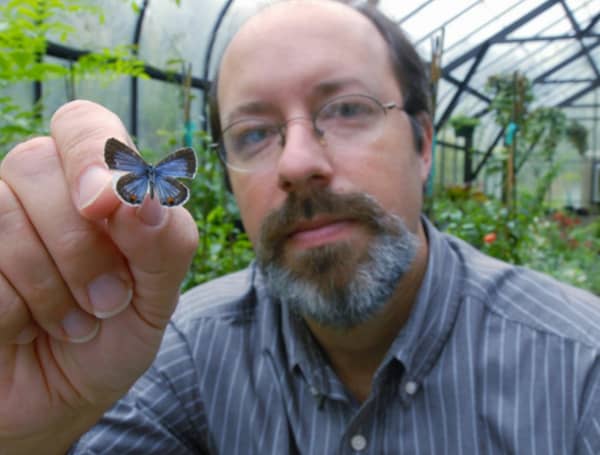
Consumers want to buy plants that enjoy a mutually beneficial relationship with fauna in their landscapes, preliminary University of Florida research shows. To help meet consumer demand, UF/IFAS researchers want to assure consumers that those plants are “certifiably” wildlife friendly.
At the annual Urban Landscape Summit April 19-21 in Gainesville, researchers will present their latest data in support of “UF-certifiable” wildlife-friendly plants. Each year, the meeting brings landscape professionals to the UF campus to hear the latest research on how to improve their practices.
Consumers have no way of knowing if the plants broadly marketed as “wildlife friendly” are truly so, said Jaret Daniels, a UF/IFAS entomology professor and lead investigator on the project.
“It is our broad goal to develop detailed production and assessment protocols that allow growers and commercial retailers to market and distribute plants that are certified wildlife-friendly – so that consumers can buy with confidence appropriate plants that not only attract wildlife such as insect pollinators but are also safe for the organisms they wish to attract,” said Daniels who’s also curator of lepidoptera at the Florida Museum of Natural History in Gainesville.
Two researchers are helping gather data to augment the certification process.
Caroline Nickerson, a doctoral student in agricultural education and communication, has surveyed about 75 nursery growers and 1,000 consumers and is analyzing the data.

Credit: Tyler Jones, UF/IFAS photography
In a survey conducted in 2021, consumers indicated they’re enthusiastic about wildlife-friendly plants and would buy into the idea of certification if plant labels were clear and if educational materials came from UF/IFAS Extension. In this project, “wildlife-friendly” really means “pollinator-friendly” and, for now, translates to the monarch butterfly and the milkweed.
“In fact, many respondents already believed that they purchased wildlife-friendly plants,” Nickerson said. “So, it is possible that they don’t yet understand that not all plants labeled wildlife-friendly are actually wildlife-friendly and that they would be receptive to education about why a certification would be beneficial.”
In 2022, Nickerson has surveyed nursery growers, who said they’re willing to offer certified plants. That’s perhaps because most view themselves as innovators, she said. But growers also see the cost of obtaining the certification as a potential barrier.
After Nickerson presents her social science data, Bernie Mach, a research scientist in entomology, will tell landscape professionals about the plants-and-insects aspect of the “UF-certified” project. Balancing pest control with conservation presents an impediment to growing and selling plants that could be considered wildlife-friendly, UF/IFAS researchers say.
Mach studies ways to control pests and, thus, reduce damage to ornamental plants and looks for ways to promote beneficial insects like pollinators.
Mach uses milkweed to answer these questions because many major pests dine on milkweed, and also because the monarch butterfly, a pollinator that many gardeners want to attract, only uses milkweed to feed its young.
Pests are bad news for both the plant and for beneficial insects like the monarch butterfly. You have to control the pests, somehow, and that can present its own problems, Mach said.
“Our latest research showed that many of the most common insecticides used to control pests on milkweed can harm or even kill monarch caterpillars,” Mach said. “Ultimately, growers will have to take into account the severity of a pest infestation, their tolerance for damage to the plants and the conservation value of the plants to beneficial insects like the monarch butterfly when making decisions about pest control.”
Visit Tampafp.com for Politics, Tampa Area Local News, Sports, and National Headlines. Support journalism by clicking here to our GiveSendGo or sign up for our free newsletter by clicking here.
Android Users, Click Here To Download The Free Press App And Never Miss A Story. Follow Us On Facebook Here Or Twitter Here.


